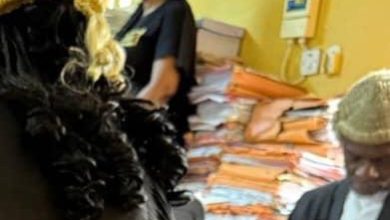
The Federal High Court in Abuja has ordered the United Bank for Africa Plc (UBA) to pay N30 million in damages for unlawfully restricting a firm’s account for over a year.
The judge, Peter Lifu, in a judgement, also ordered the bank to immediately refund $163,592 wrongfully withheld from the company, Micoz Bluelink Enterprise.
Mr Lifu held that the bank had no legal basis for freezing the business domiciliary account or transferring funds from the account without a court order or notifying the customer.
The judge described the act as “a breach of the banker-customer’s relationship.”
The News Agency of Nigeria (NAN) reports that the certified true copy of the judgment, delivered on 25 July, was made available to journalists on Wednesday in Abuja.
According to him, the UBA’s action was ultra vires its powers, reckless and bereft of mercy.
The plaintiff; Akpasi Oziegbe, owner of Micoz Bluelink Enterprise, sued UBA after discovering the restriction of the firm’s bank account. His lawyers – Chikaosolu Ojukwu, a Senior Advocate of Nigeria (SAN), and Adeyemo Richard – filed the suit on their behalf.
The plaintiff said he incorporated the firm on 19 March 2021, with a domiciliary account opened thereafter for trading operations.
On 20 July 2022, the company discovered that the account had been restricted by the bank with a balance of $163.8 million meant for supply contracts.
“The applicant made several enquiries to the bank seeking reasons for the account restriction, but the bank failed to respond or unfreeze the account,” one of the platinff’s lawyers, Mr Richard, wrote in a court filing filed on his behalf.
Mr Richard equally contended during a court hearing that the bank allegedly transferred the money on 19 August 2023 without the company’s authorisation.
The plaintiff, in the affidavit in support, maintained that “there is no mention of fraud in the call-back request presented by the bank, and the document lacks proper endorsement and authenticity.”
Bank’s defence
In its defence, UBA, through its counsel, Kalat Jatau, admitted the inflow of $163.8 million but claimed the funds were flagged as suspicious.
The bank said it filed a Suspicious Transaction Report (STR) with the Nigerian Financial Intelligence Unit (NFIU) and temporarily restricted the account pending enhanced Customer Due Diligence (CDD).
The bank alleged that, “the applicant was informed of the restriction and requested further documentation, which upon review, was found to be inconsistent with actual transaction amounts.”
It further argued that the funds were recalled following a SWIFT instruction from its correspondent bank, Citi Bank.
Judgement
Delivering the judgement, Mr Lifu held that UBA breached its fiduciary duty and acted without court approval.
“The bank failed to inform the applicant of reasons for the restriction and proceeded with unilateral withdrawal, thereby breaching the banker-customer contract,” he held.
On the validity of the bank’s evidence, the judge found UBA’s Exhibit ‘A’ defective.
“There is no mention of ‘fraud’ or ‘fraudulent’ in the document, which only states ‘Possible Duplicate,’ and does not justify a call back,” he said.
The judge also recognised the significant economic loss and business disruption caused to the applicant following the over one year restriction.
According to Mr Lifu, there is no proof the bank took appropriate steps before restricting the account or withdrawing funds, nor did it disclose where the money was transferred.
The judge held that bank customer funds could only be withdrawn from their account “pursuant to an unequivocal instruction by the customer or a court order,” and that neither of which was presented.
He declared UBA’s actions “illegal, unconstitutional and a breach of banker-customer relationship.”
The judge, therefore, cited the bank’s conduct, the applicant’s status and economic factors in awarding damages.
These, he said, include “the continual depreciation of the naira.”
Mr Lifu, thereafter, awarded a N30 million in damages in favour of Micoz Bluelink Enterprise with “post judgment interest of 10 per cent until the judgment sum is fully liquidated.”
The judge also ordered the reversal of the $163,592 withdrawal.
Judge Samirah Bature, who delivered the judgment, held that the bank acted unlawfully by relying on an ex parte ruling from a magistrate’s court without notifying the customer. He described the action as “illogical and a betrayal of the banker-customer relationship.”
“The failure of the first defendant to inform the claimant of the state of affairs on her account amounts to negligence and a breach of the duty of care owed to the claimant,” he ruled.
The court directed the bank to immediately unfreeze the account domiciled at its branch on 63 Usuma Street, Maitama, opposite Transcorp Hilton Hotel, and publish a public apology to the customer, Abhulimen & Co, in two national newspapers and on its website.
About two weeks after the judgement against UBA was delivered, the High Court of the Federal Capital Territory (FCT) in Abuja similarly ordered Another new generation Bank and the Nigeria Police Force (NPF) to pay N85 million in damages for freezing a customer’s account based on an invalid court order.
Judge Samirah Bature, who delivered the judgment on 7 August, held that the bank acted unlawfully by relying on an ex parte ruling from a magistrate’s court without notifying the customer. He described the action as “illogical and a betrayal of the banker-customer relationship.”
“The failure of the first defendant to inform the claimant of the state of affairs on her account amounts to negligence and a breach of the duty of care owed to the claimant,” he ruled.
The court directed the bank to immediately unfreeze the account domiciled at its branch on 63 Usuma Street, Maitama, opposite Transcorp Hilton Hotel, and publish a public apology to the customer, Abhulimen & Co, in two national newspapers and on its website.







